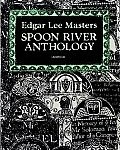 Last week in American Literature we did one of my favorite projects–unearthed from the vault, so to speak–based on Edgar Lee Masters’ Spoon River Anthology. It’s a collection of poems, each written from the point of view of a former resident (now deceased) of Spoon River. The poems are intertwined, revealing the connections between the lives of the Spoon River-ers, showing town life from various angles.
Last week in American Literature we did one of my favorite projects–unearthed from the vault, so to speak–based on Edgar Lee Masters’ Spoon River Anthology. It’s a collection of poems, each written from the point of view of a former resident (now deceased) of Spoon River. The poems are intertwined, revealing the connections between the lives of the Spoon River-ers, showing town life from various angles.
What could be more fun, for a roomful of high school students, than to imitate that?
One of the goals of my Lilly grant was to integrate more creative writing into the curriculum of my normal ELA classes. While this project isn’t new, it’s one of my very favorites and our work on pastiche at the Bart IWT reinforced my belief that imitating the masters (no pun intended) is a great way to better understand literature and the process of writing it.
We start by reading some of Masters’ poems; I hand them out at random and have students read them aloud, checking for connections between the class’ characters. (“Hey! You’re married to me! And… you killed me? RUDE!”) Then we analyze them: free verse, with a variety of poetic devices.
Then the fun begins.
Each student gets to create his or her own “character,” a former IPA student. They group up with others in the class to form connections between their characters (“Hey, we could be twin sisters who like the same guy… and we kill each other!” Or, even better: “I’m a serial killer who murders people in the bathroom, who wants to get killed?”). Their characters don’t have to be current high school students, but their poems should have a modern setting–since the original poems are examples of turn-of-the-century Realism, ours are too (for the most part… some kids’ flights of fancy fly them further off than others).
They get a few days to write their poems, and then submit two copies: one blank, one annotated with the poetic devices they’ve used. What’s next? Zombie poetry day!
We all read our poems aloud, and then we start on the arts-and-crafts phase of the project: putting our poems onto gravestones to hang up in the hallway.
With their permission, I’ll post some examples later this week, but here are my samples. First, “The School,” in imitation of “The Hill,” which opens The Spoon River Anthology.
THE SCHOOL
Where are they, the students of IPA?
Where are the little birds, the Class of 2010? Where are the others, who have flown behind them?
The ones we told to Be Respectful, Be Responsible—Be Safe:
Are they Involved? Or Focused?
No—they are here sleeping, sleeping, sleeping
Like seniors in a boring class,
The weight of their failures pulling their heads down to desks,
Ignorant now only of the world above their muddy beds.
Where are they, the students,
The athletes, the travelers, the Anime club?
Have they flown off so soon?
No, no—they are all sleeping,
Sleeping,
Sleeping,
Here beneath the ground at IPA.
I did have some fun putting that together, of course. It’s much shorter than “The Hill,” but I wanted it to all fit on one sheet of paper.
Then I wrote a sample poem. The kids are always a bit shocked by the character I came up with, but I hope she hits a quiet note of sympathy at the end.
Petunia Lawson
I never meant to hurt her: that’s the truth.
Well, no, it isn’t. I suppose
I never meant for anyone to know—I never meant
For her to slice across her skinny wrists
And keep on slicing until she was gone.
I meant to hurt her, though: to make her cry,
To frown, to grow to hate the very sight
Of notifications on her Facebook page,
The ping of a new message, even if
This time it wasn’t mine.
I meant for her to worry, to be scared,
To know that no one loved her, no one cared.
It wasn’t like she couldn’t have fought back,
Or changed her hair, or gotten better clothes.
She asked for every insult, cringed and bore,
Until the day she didn’t anymore.
And like Ophelia, headed for the pond,
Her messages made less and less sense, and then
She cut us off. She blocked us all, not well
But permanently. Now I find myself
Checking my status updates for her “likes”
And staring and refreshing all night long,
A vampire without blood, no new red bubbles, nothing left:
Her veins are dry, and my in-box is empty.
Now even though she lies next door to me,
We never seem to talk much anymore.
I love hearing what they come up with (this year’s winner is definitely the bathroom serial killer–and once some other kids got involved, we also heard from his first victim, the school official who almost caught him, and the official’s wife, who kills the killer later). I’m going to put the whole project up on Teachers Pay Teachers eventually, but for now, here’s your sneak peak. 😉